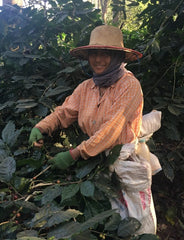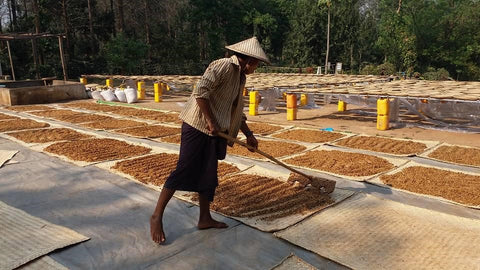When we first looked into getting coffee from Myanmar, back in May 2018, I always wanted to write about it. At the time, we only sourced a small amount. This kind of tested the water so to speak, in terms of how our customers at the time would receive it.
It was not a coffee that was to be found in the UK very easily but just the name Burma/Myanmar was enough to get people talking. There were mixed comments and discussions about the coffee and its origin. Some customers chose not to drink it (we had it on our brew bar) because of the controversial aspect of the coffee’s origin. Most of the comments we heard were mainly comments such as: ‘oh I’m not sure I want to support that’ or ‘no way, don’t want to drink coffee from there’.
THE QUESTION
 So, I will try and answer this question, because for me, for us, its always about the people behind the coffees we source. So, my question at the time was: if you know exactly where the coffee comes from (which you do, because its traceable), you know which farm it comes from and a bit about the individuals behind it, you know it has an SCA score which makes it a specialty grade coffee and that by paying for this coffee you are supporting the individuals working hard to produce this coffee in order to support their families and community, then why would some be ‘boycotting’ this?
So, I will try and answer this question, because for me, for us, its always about the people behind the coffees we source. So, my question at the time was: if you know exactly where the coffee comes from (which you do, because its traceable), you know which farm it comes from and a bit about the individuals behind it, you know it has an SCA score which makes it a specialty grade coffee and that by paying for this coffee you are supporting the individuals working hard to produce this coffee in order to support their families and community, then why would some be ‘boycotting’ this?
My question is still relevant, and although I respect someone’s choice to disagree, I would like to make my case.
THE COFFEE INDUSTRY IN THE PAST
Myanmar, formerly named Burma, is geographically located between two major developing economical powers India and China. It also shares a border with Bangladesh, Laos and Thailand. This, I’m sure. has plenty to do with the country’s great ethnic diversity. There are two main coffee producing regions, the Mandalay division and the Shan state. Although they sit geographically next to each other, they differ quite significantly. Shan state is at a higher altitude (1400-1600masl) and is exclusively Red Catuai variety. The Mandalay region is characterised by large single estates and the varieties grown there are typically SL 34 (the Kenyan variety) and Catimor.
Coffee production is not as new to Myanmar as you may think. It was first introduced in 1885 by British colonists when missionaries brought Robusta seeds from India and established small farms. Arabica seeds were introduced soon after, but it wasn’t until 1930 when the first arabica seeds were planted around the city of Pyin Oo Lwin in Mandalay division (where our coffee comes from). Coffee production commercially didn’t take off at first and when the British left, the coffee business lay pretty much dormant.
Coffee was being produced privately until all farms were nationalised by the government in 1962. However, its interesting to note, that nationalisation did not help; production actually dropped, and any coffee produced was headed for the local market.
In 1997 farms were privatised once again with the government providing grants in order to stop deforestation and stop farms being used for Opium cultivation.
THE FARM
 The farm sits on the outskirts of the city of Pyin Oo Lwin, where the coffee plants grow under the shade of silver oak trees and macadamia trees, with erythrina used as a short-term shade solution.1997 was also the year when Ngu Shweli estate was established, by its founder U Kyaw Sein which makes this estate the oldest in the region. U Kyaw Sein was originally involved in growing peas and mining for Jade but decided to turn his hand to coffee production.
The farm sits on the outskirts of the city of Pyin Oo Lwin, where the coffee plants grow under the shade of silver oak trees and macadamia trees, with erythrina used as a short-term shade solution.1997 was also the year when Ngu Shweli estate was established, by its founder U Kyaw Sein which makes this estate the oldest in the region. U Kyaw Sein was originally involved in growing peas and mining for Jade but decided to turn his hand to coffee production.
Out of the 235 acres of the farm, 215 acres are dedicated to coffee growing. The farm now also has its own nursery which means he doesn’t have to stump the trees, instead preferring to replant with new seedlings. It is also one of the first farms in the area to provide ripe cherries and the beans are picked and processed on the farm if they are honey or natural. If they are washed, they are taken for processing at Mandalay Coffee Group (MCG)’s facility a short distance away.
OPPORTUNITY FOR GROWTH, THE FUTURE
The coffee industry in Myanmar definitely has faced difficulties along the way and will likely face more. There are many reasons why and one of them is definitely related to my question above and the people’s opinions on the political situation of the country and how this affects their decision to purchase or not.
But, it all comes down to the individual farmers who are striving to produce the best they can in order to make a living just like you and me. This is why steps have been taken by the wider coffee industry, outside of Myanmar to help these individuals reap the benefits of their hard work.
The Specialty Coffee Association have become involved and a lot of Myanmar’s coffee is now graded and has earned specialty grade certification. This alone, has given farmers access to the ever-growing specialty coffee scene and into the international markets. Various programs have taken place to modernize Myanmar’s coffee industry, updating farming practices helping farmers to reap the benefits.
FINAL THOUGHTS

Myanmar’s humanitarian crisis is not to be ignored but the country’s transition to democracy is opening up its economy and even though Myanmar has much more to do, it is a perfect example of positive trends in the specialty coffee industry. The specialty coffee community is able to offer the farmers opportunities which are also competitive and therefore healthy.
By purchasing coffee from developing sources such as Myanmar, you can help promote improvement happening there. The coffee world is changing continually and sometimes its for better and sometimes not so much. In the case of Myanmar, it is definitely for the better. Why? Quality is going up (which means you get a better cup of coffee) and this in turn means a higher quality of living for the farmers through higher wages. Surely this is something we can all get behind.
There have been a number of roasters that have and are supporting this origin and we are proudly one them. Myanmar is still a newcomer when it comes to coffee, but don’t be surprised if you see more of it popping up in the future. It’s a complex country with complex conflict and uncertainties lie ahead, but we believe in the individual farmers and hope that our support is worth it.
https://quantumroasters.co.uk/products/myanmar-coffee-beans


